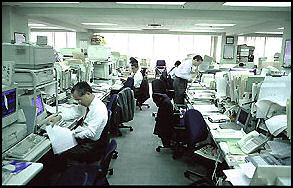JAPANESE WORKERS AND THEIR COMPANIES
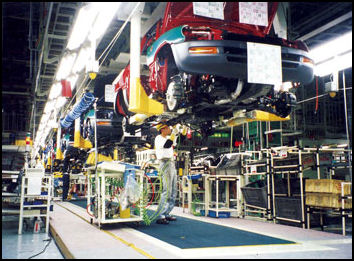
Toyota workers Japanese companies have traditionally put the welfare of their employees over making profits and regarded creating secure jobs for their employees as being more important that paying dividends to their shareholders. Companies are often resistant to making changes that sacrifice the well-being of employees in the name of increased efficiency.
Many workers work for one company their entire life. Japanese firms traditionally invested large amounts of money training their workers, which is one reason why they demand company loyalty. There has traditionally been a strong social stigma attached to job-changing.
Corporate life in Japan includes subsidized dormitories with cramped rooms and shared bathrooms for single employees, company-sponsored drinking binges and corporate outings and visits to the company founder’s ancestral grave. There are even company-sponsored sports festivals with dodge ball and rope skipping.
Many workers have little other identity other than the company they work for. “Soshikiryoku” is a term used to describe team spirit and togetherness that Japanese corporations try to foster and promote to motivate employees, get them to work together and keep morale high. This contrasts with the individualistic, dog-eat-dog competition and merit-based pay promoted in Westerner corporations.
Companies are regarded as social organizations not just a collection of financial and physical assets. The company is regarded as something that belongs to the employees not the shareholders. Bosses make personal visits to employees families. They take care of hospital arrangements for sick workers. Directors and managers usually come from within a company rather than outside it.
Many employees at Japanese companies start the day with calisthenics and rousing renditions of the company song. See Industries, Panasonic
Good Websites and Sources: Employee Loyalty at the Workplace managementjournals.com ; Wikipedia article on Japanese Work Environment Wikipedia ;Lifetime Employment; Concepts and Measurements allacademic.com ; Lifetime Employment. Three Models pdf file bls.gov/opub/mlr ; End of Lifetime Employment kent.edu/oeoc ; Rethinking Lifetime Employment (2009) businessweek.com ; New York Times? Secure Jobs Have a Cost (2009) nytimes.com
Links in this Website: LABOR, UNEMPLOYMENT AND UNIONS IN JAPAN Factsanddetails.com/Japan ; WORKERS AND THEIR COMPANIES IN JAPAN Factsanddetails.com/Japan ; FREETERS, TEMPORARY WORKERS AND FOREIGN WORKERS IN JAPAN Factsanddetails.com/Japan ; WORKING WOMEN IN JAPAN Factsanddetails.com/Japan ; JAPANESE SALARYMEN Factsanddetails.com/Japan ;
Traditional Employment System in Japan
Japanese companies have generally recruited workers immediately upon graduation from a school or university without requiring them to have job-specific skills, though basic ability is essential. This is due to the fact that mass production took rapid hold in Japanese companies after World War II. To train employees, companies offer hands-on experience, or invest in education and inhouse professional training for the newcomer. Naturally, several years elapse until these new employees become efficient. In exchange, employees have been expected to remain with the same employer until they reach the mandatory retirement age (usually age 60). Upon retirement, they receive a lump-sum payment and a company pension. [Source: Web-Japan, Ministry of Foreign Affairs, Japan]
“When business is depressed, regular employees are dismissed only as a last resort. Wage increases and promotions are primarily governed by the employee’s age and length of service in the company. This institution of seniority-based wages — devised as a means of guaranteeing the stability of employment to all employees throughout their careers within a company — is closely connected to lifetime employment as a distinguishing characteristic of Japanese-style management.
“Japanese companies typically provide fringe benefits that enable employees to enjoy recreation and leisure activities, such as athletic competitions, employee excursions, and so on. Employees have access to the facilities for hobbies, including sports, reading, and board games. As for other benefits, companies offer special allowances in addition to the basic salary, company-owned housing, dormitories for single workers, and various health and welfare benefits. In the framework of the lifetime employment system, workers in general have found it to their own advantage as well as to that of their families, to demonstrate loyalty to their company. In addition to this, they have given precedence to company considerations over those of their family and personal life.
“Transfers to subsidiaries are quite common, and there are many cases where transferees leave their families behind, if it is the family’s desire to remain in the community and/or avoid disrupting the children’s education. Even in the postwar decades of rapid economic growth, however, this system was not universal. It applied mainly to the employees of large enterprises and to civil servants. Workers at small companies seldom received the same degree of benefits or job security.
Company Perks in Japan
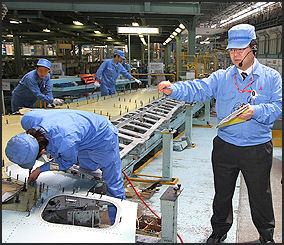
Mitsubishi workers Many Japanese companies let their workers use resorts either owned or leased by the company or provide workers with recreation facilities such as swimming pools, tea-ceremony rooms, baseball diamonds and meeting halls where they can take classes in English flower arranging or Japanese swordsmanship. The Japanese expression "octopus pot culture" refers to workers who are reluctant to leave their places of employment because they are more comfortable there than at home.
Hitachi provides workers with apartments that are outfit with Hitachi appliances. The company sometimes arranges marriages for workers at their Tie the Knot office.
Companies often give extra money to employees with dependent children. One Japanese politician wrote that Japanese workers "are owned like pets by their companies” and said their perks were “the equivalent of dog food." Japanese laws make it cheaper for companies to provide their workers with houses, cars and even meals in expensive restaurants than it is for Japanese individuals and families to provide these things for themselves.
Many companies have cut back on perks because they can no longer afford to provide them.
Company Housing in Japan
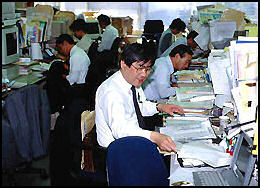
Companies sometimes provide dormitories for unmarried workers and apartments in housing projects for families. In Tokyo, single workers for Asahi beer are provided with studio apartments for $80 a month and couples and families live in larger apartments for $250 a month, often in neighborhoods where the same apartments go for $5,000 a month. The personnel department helps workers find dates. There is a wedding room in the workers recreation center.
In 1993, more than 2 million apartments and dormitory rooms were own or leased by companies for their employees. The government has 343,000 rooms, apartments and houses for its civil servants that are rented out for as little as $20 a month. For people who want to buy their own home, companies often provide mortgages at low interest rates.
Some employees don't like living in the same buildings as their bosses and coworkers or a dormitory where all the residents are of the same sex and they they have to sign in and sign out when they come and go. Other like the camaraderie that develops from having friends from work nearby. Some dormitories and company housing projects provide cheap meals, iron clothes for free and have health clubs, squash courts and swimming pools.
Hiring New Employees in Japan
Once out of college "exam hell" begins once again as job applicants take rigorous, highly-competitive tests to get good jobs in good companies and government ministries. For almost every profession — from Japanese language teacher to accountant — passing a difficult exam is necessary to get a job. Job candidates for companies often have to take a series of written exams for each company.
People often get jobs through their connections not their abilities, test scores work experience or letters of recommendation. Students are often dependant on their professors and their connection for university positions or company jobs. This discourages students from trying to strike out on their own, pursue their own ideas or do anything that might offend their professors. Professors and even high school teachers help their students secure jobs and are often called upon to give speeches at weddings.
Graduates and near graduates attend large cattle-call interviews in convention centers. In the old days companies recruited at the college campuses a year before graduation. New recruits were assigned to department long before they officially showed up for their first day of work.
When Japanese companies hire new employees they often looking people who are popular and get along with others rather the people with brains and imagination. Companies typically investigate the families or applicants to make sure there are no whiffs of scandal.
Job hunting has traditionally been very expensive in Japan. Money is spent on suits and dresses and transportation cost. Some spend $3,000 or $4,000 on transportation expenses and hotels in their search for work. Others wear the same suit or dress over and over to save money.
A survey by the Yomiuri Shimbun in 2007 found that 82 percent of young people were either anxious a “great deal” or “to some extent” about their futures. The job market faced by recent graduates is often affected by conditions in the Japanese and global economy. In the mid 2000s when the Japanese economy was strong companies were pulling out all the stops to attract the best and brightest. During the global financial crisis in 2008 and 2009 some job seekers had job offers retracted.
Many new hirees begin work in April with an initiation ceremony and lecture from company leaders. At orientation for new employees the company president gives a speech to new recruits all dressed in identical black suits.
Job Security and Lifetime Employment in Japan

Toyota workers in the 1970s While American companies have traditionally enjoyed the freedom to hire and fire as the please; Japanese companies traditionally took a more paternalist approach and were rewarded with low turnover rates.
Company executives have traditionally treated the people working under them like family and have felt a moral obligation to take care of them. When an employees gets seriously ill the company of often as involved in the decision making process as the wife and immediate family is.
Many Japanese companies promise workers lifetime employment. Japanese companies refrain from firing workers to avoid damaging their domestic image or affecting the moral of their work forces. An executive at NEC told writer Steven Vogel, “We could not lay off workers in Japan. We have 150,000 workers. And most of them have families. If we laid them off, the local government would get after us, and the media, too.”
History of Lifetime Employment in Japan
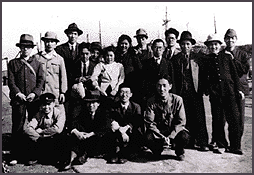
Sony eemployees in the 1950s Despite the common myth Japanese companies have not always asserted a paternalistic role with their employees. “Early in Japan’s industrialization process, workers, especially those in blue-collar occupations, carried on the independent ethos of the traditional craftsmen and artisans, frequently changing their jobs in search of the most satisfying working conditions,’sawa Kurotani of Redlands University wrote in the Daily Yomiuri. “Companies devised lifetime employment and seniority-based promotion” strategies that later became the centerpiece of Japanese-style management practices — in their efforts to retain highly-skilled employees. As Japan’s industrialization progressed, these permanent practices spread across industries and eventually, became commonplace.”
“Postwar Japanese corporations emphasized teamwork and employees loyalty to the corporate collective to increase efficiency and productivity. Corporate employers rewarded their loyal core employees with generous compensation, both tangible and intangible, and encouraged social activities among employees to build a sense of belonging. In turn...salarymen...became highly dependent on their corporate employment, both financially and psychologically. By and large these strategies were highly successful, and Japanese corporations and the Japanese economy throughout the latter half of the 20th century greatly benefitted from this system.”
Things began to change in 1990s when the bubble economy burst. “While work demands appeared to ease up with the economic slowdown, different sources of stress began to affect corporate workers...Japanese corporations began radical restructuring and downsizing to survive in global competition, and corporate paternalism eroded quickly. Layoffs caught many salarymen by surprise, as they assumed they had a stable jobs for the rest of their productive lives. Those who were able to hold on to their jobs discovered that their workplace turned into a place of severe competition where each individual worker was held accountable for measurable results.”
Worker Systems in Japan
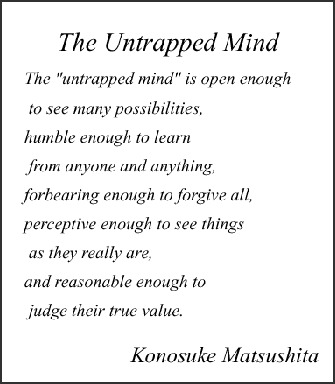
Panasonic words of wisdom Toyota introduced many production techniques that became standards of Japanese industry — just-in-time delivery, multi-skilled work teams and pursuing continuous improvement. The Nissan motor company drew some attention for giving employees cash rewards of $1 to $23,000 for every new idea or suggestion, regardless or whether it was adopted or not. This is known as the kaizen system. On average Japanese workers make 24 suggestions a year, many more than their American counterparts.
Many companies are abandoning assembly line automation in favor craft work or cell-style production in which a group of works produce a product from beginning to end because they find these systems to be more efficient. At a Sony plants workers assemble entire camcorders themselves on "spiral line" tables. The methods has proven to be 10 percent more productive than the conventional way of way making the cameras.
"The spiral performs better," wrote Michael Williams in the Wall Street Journal, "because it frees efficient assemblers to churn out more products instead of limiting them to a conveyor belt's speed. It reduces handling time, the seconds consumed as goods under production are passed from worker to worker. And if something goes wrong, only a small section of the plant is affected."
"There is no future in conventional conveyor lines," a Sony consultant told Williams. "They are a tool that conforms to the person with least ability." Many of Sony's assembly lines are run primarily by robots."
Companies are also experimented with production lines that look like Ys, 6s, and insects. "under NEC's old conveyor system," wrote William, "an assembly line of 70 people made 1,000 phones a day. Now 35 people in two spiders produce that many." Other advantages of the spider include the fact that they take up less space; and they are easier, quicker and cheaper to set up and take down.
Sometimes workers and even managers are punished for sloppy work with pay cuts for several months.
Companies in many different sectors are shifting their manufacturing abroad, especially to China.
Skilled Workers in Japan

As part of an effort to reward skilled craftsman, the government has created a the special designation of “Supaa Ginosha” ("Super Craftsmen") to honor around 1,125 craftsmen for who are regarded as so skilled machines could never come close to matching their abilities.
Many of these skilled workers are in the automotive and electronics industry. One of them, Takayuki Kosuga, a lathe worker at Toshiba for over 30 years, makes parts for medical equipment and satellites and can make parts within a 1000th of millimeter, 20 times more precise than the best machines.
Okano Kogyo, a precision metal company in Sumida Ward Tokyo with only five employees, manufactures hypodermic needles that are so thin (0.2-millimeters thick) they can barely be felt when they pierce the skin. Produced on sheets of metal that look like film for the medical appliance maker Teremo Corp , the needles are made for diabetes patients so they don’t suffer pain from repeated insulin shots. Okano Kogyo has also developed thin skins for cell phone batteries made from a single piece of sheet metal that enable the phones to use lithium-ion batteries, giving the phones more battery power in a small size.
Window Sitters in Japan
"Payrolls are bloated with 2 million to 5 million underutilized workers. Many of them are known as 'window sitters,' white-collar men automatically hoisted upwards for years only to be dropped into jobs on the fringes of their workplaces, where they read magazines and continue to take home high pay." [Source: Evelyn Richards, Washington Post]
Workers at some companies take home as much as 60 hours a month in overtime when the spend much of their times at meeting discussing soccer, baseball and horse racing.
In Japan, there are flag men everywhere. They can be found on sidewalks and roads that have only a handful of cars traveling on them each day.
Worker Dissatisfaction and Job Changing in Japan
There is growing worker dissatisfaction in Japan with some employees taking the once blasphemous action of switching companies. In one survey, 60 percent of Japanese adults said they would consider changing employers. In another survey, three fourths of young workers said say they were ready to change jobs if something better came along.
Some worry that new production methods may lead to lay offs and social tensions among workers. One company found that 500 of its 3,000 were no longer necessary when it switched over to a more efficient production system. Some of the workers were laid off and other were females who quit to have children.
Japanese firms traditionally have invested large amounts of money training their workers, which is one reason why they have demanded company loyalty and discouraged job-changing. Now potential employees are taking more responsibility in training themselves. Many people study abroad or attend new training schools to learn new skills. More and more Japanese workers are changing job by their own volition. Those that do usually are motivated more by finding a job they like than by money.
Bullied Employees in Japan
Bullied employees, whose counterparts in the U.S. would be laid off, are demoted, harassed, subjected to nasty rumors, assigned to doomed projects, forced to take 20 percent salary cuts or are confined "window desks” away from other employees. One bullied employee, who sough psychiatric help, told AP: "It was so stressful I sued to take tranquilizers and smoke 80 cigarettes a day."
Many of the victims of company reorganization schemes are salary men in their 50s. The Washington Post described one researcher at a major rubber company who was told by his boss to write a 10 page report on the same subject every two weeks. A 52-year-old salary man at another company was told by his boss, "Your coming to the office is a nuisance because there is no seat for you. No division wants you. Think about what you should do." The idea is that companies don't want to be impolite and lay off the worker, they want the workers to decide for themselves it is time to retire.
"Pawa-hara" (an abbreviation for "pawa harasumento") is a Japanese term that literally means "power harassment." The act of committing pawa-hara refers to bullying or harassing coworkers in the office or elsewhere by taking advantage of one's position. In most cases, pawa-hara can be committed against an employee by his or her superior under the pretense of doing necessary work. In some cases, however, computer-savvy workers could be accused of committing pawa-hara against their bosses by, for example, making fun of their lack of computer literacy. [Source: Yomiuri Shimbun, February 21, 2012]
pawa-hara combines the words "power" and "harassment." The act of committing pawa-hara may resemble what is referred to as "mobbing" in English, which means the bullying of an individual by a group in the workplace.
“A panel of government-commissioned specialists has identified six forms of pawa-hara. These include ignoring coworkers or subordinates, treating them as outsiders and brutally speaking ill of them. Another form of pawa-hara is forcing subordinates to do an extraordinary amount of work, knowing they will be unable to finish it.
In April 2012, Jiji Press reported: “In answer to the survey conducted by household products maker Lion Corp., the largest group of respondents chose "Do you understand what I'm saying?" as the phrase spoken by their bosses that made them feel pressured when they were still fresh at their workplace. The phrase was selected by 35.2 percent. "Don't you understand this?" came next with 24 percent, followed by "I expect a lot from you," selected by 23.6 percent. "What's happened to it?" used to request a report on the progress of pending issues came fourth, backed by 22.4 percent. The March 30 to April 2 survey covered 500 men and women in their 20s in their second year of work.Nearly two-thirds, or 64.2 percent, mentioned loose bowels and stomachache as symptoms they felt when they experienced pressure from their bosses. Asked how they relieved stress, 33.8 percent said they communicated with people outside their workplace. [Source: Jiji Press, April 16, 2012]
Employment in Japan in Transition
The traditional Japanese employment system was well suited to the building of a modern industrial society. It provided a stable and skilled resource base for manufacturers as they expanded production during the decades of strong economic growth prior to 1990. However, two key elements of the system — lifetime employment and seniority-based wages — function best in a growing economy and have proven difficult to sustain in the prolonged recession that followed the collapse of the so-called bubble economy at the start of the 1990s. [Source: Web-Japan, Ministry of Foreign Affairs, Japan]
“The need to cut costs and increase efficiency is having a severe impact on employment in Japan. Companies are reducing hiring of new graduates, pushing “voluntary” early retirement programs for older workers, transferring people to lower paying positions, and even resorting to outright layoffs as part of their restructuring efforts. In addition, a growing number of companies are replacing seniority-based wages with performance-based systems. In any country, an employee thrown back into the job market after working 20 or even 30 years in the same company will have a tough time finding a new job at a level close to the old one. This is especially true in Japan, however, because big companies remain reluctant to hire mid-career workers.
“As the economy recovers Japan is likely to experience growing structural unemployment where excess workers exist in one sector of the economy while another sector suffers from a labor shortage. A key challenge facing the Japanese government is to develop the systems and support mechanisms needed to help people obtain the skills necessary to move into a new industry. Changes are also taking place on the supply-side of the employment system. Recognizing that no matter how loyal they are to a company, there is no guarantee of lifetime employment, young people are increasingly willing to leave one job in search of another offering more money, more satisfaction, or both.
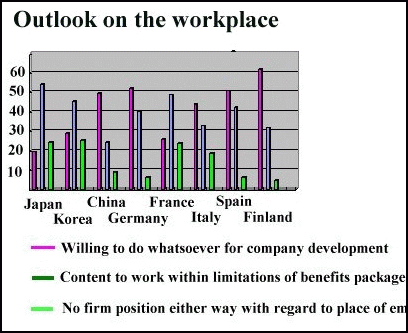
Changes in Japanese Society and Work
In the midst of changing economic conditions, as well as the graying of the population and low birth rate, the traditional Japanese employment practices of lifetime employment and seniority-based pay have begun to erode, and various new systems have emerged. Ever since the end of the bubble economy, companies have been hiring fewer regular employees, while the number of contract and part-time workers has increased. Unemployment among those irregular workers has become a society-wide issue in the wake of the global financial crisis. As of 2009, the safety nets for temporary and other workers are being strengthened. Under one plan, for example, people who are out of work but cannot receive unemployment insurance benefits are able to get a monthly allowance of ¥100,000 to ¥120,000 while acquiring on-the-job training in computers, nursing care, or another occupation. As of February 2011, the unemployment rate was 4.6 percent, which is relatively low compared with current global levels. [Source: Web-Japan, Ministry of Foreign Affairs, Japan]
During the period of recession and stagnation in the 1990s and early 2000s, many companies downsized, restructured and introduced merit pay and promotion schemes. Japan Airline reduced its work force from 22,000 in 1993 to 17,000 in 1998. Department stores dispensed with the army of service personnel who bowed to guests as they entered the store, operated elevators and wrapped purchases in pretty boxes with bows.
There has also been a trend to reward leadership and creativity. Japanese companies have begun promoting managers based on their leadership skills and ability to motivate workers and begun hiring new employees based on their creativity and desire and rather than simply their ability to take stress and graduate from good university.
Lifetime employment and seniority-based salaries are collapsing. These days it is not uncommon to find to executives in their early 40s working for large, famous companies serving as bosses for 5,000 employees many of them in their late 40 and 50s. In the old days promotions were based on seniority and it would have been an insult to work under a boss that was younger than you.
Many young employees like the new system because it means that they can advance faster while older employees don't like it because it means promotions are sometimes withheld if they don't perform and they have endure the humiliation of answering to younger bosses.
To save jobs employers are asking workers t take pay cuts and entering in European-style work-sharing programs. These ideas haven’t been well received.
Some have argued that Japan’s problem, is its tendency to ignore talent in the form of women and quirky individualists who have a hard time finding rewarding jobs in Japan’s corporations. Many say that Japan needs to create more opportunities for women and people with talent. Already many of the best and brightest flee Japan to find rewarding jobs and meaningful employment abroad.
Image Sources: 1) 3) Toyota, 2) Canadian government, 4) Sony, 5) Panasonic, 6) Association for the Promotion of Traditional Crafts Industries in Japan, 7) Goods from Japan , japan-photo.de japan-photo.de ;
Text Sources: New York Times, Washington Post, Los Angeles Times, Daily Yomiuri, Times of London, Japan National Tourist Organization (JNTO), National Geographic, The New Yorker, Time, Newsweek, Reuters, AP, Lonely Planet Guides, Compton’s Encyclopedia and various books and other publications.
Last updated August 2012

